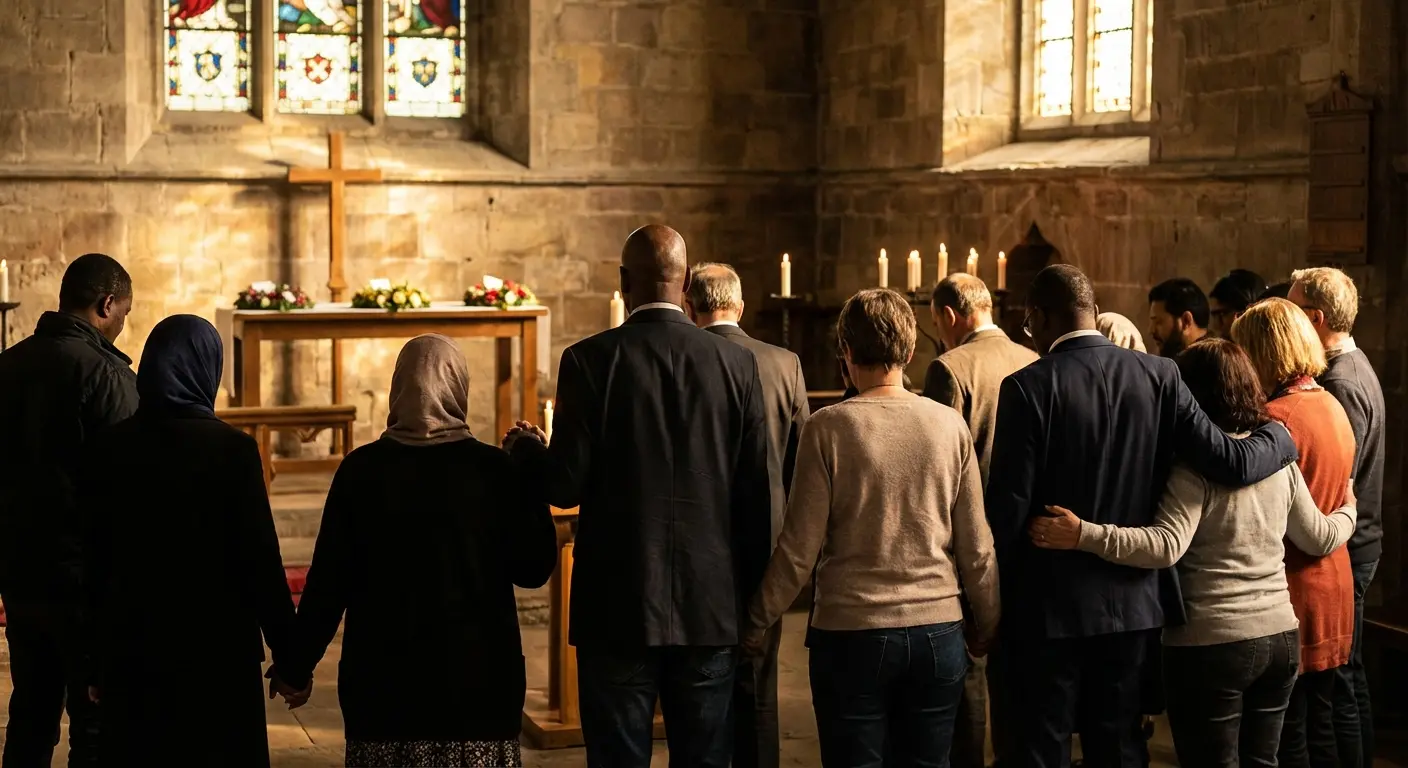Most eulogies include a Bible verse, but finding the right one often feels like searching for a needle in a haystack. I still remember sitting in the second pew at my grandmother’s funeral, watching my uncle stumble through a generic scripture reading. He picked a verse because it was famous, not because it meant anything to her. It felt flat. It felt disconnected.
Quick Resource
Eulogy Generator
https://eulogygenerator.com/
A guided writing tool that helps you turn Bible verses, memories, and emotions into a complete eulogy that feels sincere and personal—not generic.
That moment stayed with me. It taught me something huge about saying goodbye: the right words can turn a standard service into a moment that actually feels like them. Choosing eulogy Bible quotes isn’t about filling dead air or checking a religious box. It’s about being real. It’s about finding a sentence that sounds like something the person you lost might have believed in, or one that offers a little bit of relief to the people crying in the pews. We want to honor who they were, not just do what we think we’re “supposed” to do.

TL;DR
- Keep it Real: Pick a verse that actually sounds like the person you lost, not just something that sounds “churchy.”
- Read the Room: Choose quotes that will comfort the people sitting there, even the ones who might not be super religious.
- Who Were They to You? A verse for a mom hits differently than a verse for a best friend. Match the quote to the bond you shared.
- Sadness vs. Hope: Try to find a balance. You want to acknowledge that this hurts, but also that it’s going to be okay.
- Short is Sweet: People are emotional and tired. Pick something short and powerful rather than a long, complicated chapter.
- Need help writing? If you’re stuck, tools like Eulogy Generator can help you frame these quotes into a speech.
How to Pick the Right Quote
Picking a Bible quote takes a little more thought than just closing your eyes and pointing at a page. You have to think about what the person actually believed, finding that weird balance between “this is sad” and “this is a celebration,” and who is going to be listening. Here are a few things to keep in mind before you decide.
Not sure which verse truly fits the person you lost?
The Eulogy Generator helps match scripture to their life:
https://eulogygenerator.com/
Does It Fit Their Faith?
This is the big one. If faith was their rock, pick a verse that shows that. But you have to match their specific vibe. If they were the quiet, charitable type, a verse about love works best. If they were a fighter who battled illness or hard times, look for passages about strength and endurance.

Reading the Room (Tone)
Eulogies are a tightrope walk. You want to be honest about the pain of losing them, but you don’t want to leave everyone in a dark pit of despair. Look for verses that say, “Yes, this hurts, but there is hope.” You want to lift people up. If things feel too heavy, you might want to pair the scripture with some uplifting funeral quotes to let a little light in.
Struggling to balance sadness and hope in a religious service?
Use the Eulogy Generator to shape the right tone:
https://eulogygenerator.com/
Your Relationship to Them
Who were they to you? That changes everything. A verse you’d pick for a parent usually focuses on wisdom or legacy. A verse for a best friend might be more about loyalty and walking through fire together. Don’t feel pressured to pick a “parent” verse for a friend just because it sounds formal.
| Relationship | Main Vibe | Emotional Feel |
|---|---|---|
| Parent/Grandparent | Legacy, Wisdom, Guidance | Respectful, Grateful |
| Spouse/Partner | Deep Love, Reunion | Intimate, Heartbroken but hopeful |
| Sibling/Friend | Loyalty, Shared History | Warm, Nostalgic |
| Child | Innocence, Comfort | Gentle, Protective |
A verse for a parent hits differently than one for a friend.
The Eulogy Generator adapts the speech to your bond:
https://eulogygenerator.com/
Including Everyone
Funerals bring everyone together—religious aunts, atheist college friends, and neighbors who might be from a totally different background. It’s usually smart to pick quotes with universal themes like peace, love, and kindness. Avoid the super dense, “fire and brimstone” stuff. The goal is to bring people together, not divide the room.

Connecting to Their Life
The best quotes make people nod and say, “Yep, that was him.” Did he have a favorite verse written in the front of his Bible? Did she live her life exactly like the “Good Samaritan”? Personalizing the scripture helps people connect the words on the page to the person they miss.
Keep It Simple
When people are grieving, their attention spans are short. They are tired and emotional. Skip the long, complicated theology lessons. A short, punchy verse usually hits harder than three paragraphs of text. If you’re worried about losing the crowd, mix in some short funeral quotes that get straight to the point.
The Vibe of the Service
Read the room before you write the speech. Is it a high-mass cathedral funeral? Go with the classics. Is it a backyard celebration of life with a BBQ afterwards? Maybe choose something more joyful and focused on gratitude.
25 Eulogy Bible Quotes to Choose From
I’ve pulled together 25 options broken down by theme. Hopefully, one of these jumps out at you.
Category 1: Comfort and Hope
These are for when the grief feels fresh and heavy. They remind us we aren’t doing this alone. If you need more options specifically for the service, check out our list of Bible verses for memorial services.
Tip: You don’t have to be a preacher to read these. Just say something like, “Since [Name] passed, I’ve been clinging to this verse…”
1. Psalm 34:18
“The Lord is near to the brokenhearted and saves the crushed in spirit.”
This is a gentle one. It validates that yes, we are crushed right now, but we aren’t abandoned.
2. John 14:27
“Peace I leave with you; my peace I give to you. Not as the world gives do I give to you. Let not your hearts be troubled, neither let them be afraid.”
If your loved one was a calming presence—the kind of person who made everything okay just by walking in the room—this is a great tribute.

3. Matthew 5:4
“Blessed are those who mourn, for they shall be comforted.”
Simple and classic. It’s a promise that it’s okay to cry, and that peace will come eventually.
4. Revelation 21:4
“He will wipe away every tear from their eyes, and death shall be no more, neither shall there be mourning, nor crying, nor pain anymore, for the former things have passed away.”
This is a hopeful one. It paints a picture of a future where this kind of pain doesn’t exist anymore.
5. Isaiah 41:10
“Fear not, for I am with you; be not dismayed, for I am your God. I will strengthen you, I will help you, I will uphold you with my righteous right hand.”
For the person who faced a lot of scary things in life but kept going anyway. It’s about strength.
Found a comforting verse but don’t know how to introduce it?
The Eulogy Generator helps you connect it to real memories:
https://eulogygenerator.com/
Category 2: The Big Picture (Eternal Life)
These quotes focus on the idea that this isn’t the end.

6. John 11:25-26
“I am the resurrection and the life. Whoever believes in me, though he die, yet shall he live…”
A powerful choice for someone who was a devout believer. It cuts right to the core of the Christian faith.
7. 2 Timothy 4:7
“I have fought the good fight, I have finished the race, I have kept the faith.”
I love this for someone who lived a long, full life. It sounds like a victory lap.
8. Psalm 23:6
“Surely goodness and mercy shall follow me all the days of my life, and I shall dwell in the house of the Lord forever.”
Most people know Psalm 23. It’s familiar, comforting, and feels like a warm blanket.
9. Romans 8:38-39
“For I am sure that neither death nor life… will be able to separate us from the love of God…”
This is the “nothing can break this bond” verse. It assures everyone that love is stronger than death.
10. Ecclesiastes 3:1-4
“For everything, there is a season, and a time for every matter under heaven…”
This helps when you’re trying to make sense of the timing of things. It brings a sense of natural order to the chaos of loss.
Category 3: Love and Friendship
These celebrate the people who loved hard.
11. 1 Corinthians 13:4-8
“Love is patient, love is kind…”
You hear this at weddings, but it’s actually beautiful at funerals for someone who really embodied kindness.
| If They Were… | Try This Verse | Why? |
|---|---|---|
| The Peacemaker | Colossians 3:14 | Highlights how they held the family together. |
| Selfless | John 15:13 | Honors how much they sacrificed for others. |
| A Ride-or-Die Friend | Proverbs 17:17 | For the person who was there when things got ugly. |
| A Loving Parent | 1 Corinthians 13 | Reflects that unconditional “parent” love. |
12. Proverbs 17:17
“A friend loves at all times, and a brother is born for adversity.”
Great for a best friend or a sibling. It speaks to the people who stick around when life gets hard.
13. John 15:13
“Greater love has no one than this, that someone lay down his life for his friends.”
Often used for veterans or first responders, but also fits anyone who always put others first.

14. Colossians 3:14
“And above all, put on love, which binds everything together in perfect harmony.”
For the glue of the family. The one who organized the reunions and settled the arguments.
15. Hebrews 10:24
“And let us consider how to stir up one another to love and good works.”
For the cheerleader. The person who always pushed you to be better.
Want scripture to feel personal, not recited?
Let the Eulogy Generator weave it naturally into your tribute:
https://eulogygenerator.com/
Category 4: Strength and Grit
For the tough ones.
16. Joshua 1:9
“Be strong and courageous… for the Lord your God is with you wherever you go.”
A reminder that they were brave, and now we have to be brave too.
17. Isaiah 40:31
“But they who wait for the Lord shall renew their strength; they shall mount up with wings like eagles…”
A beautiful image of rising above the pain and struggle.

18. Proverbs 31:25
“She is clothed with strength and dignity, and she laughs without fear of the future.”
The ultimate verse for a strong mother or grandmother who handled everything with grace.
Category 5: Deep Faith
Honoring their spiritual life.
19. Psalm 46:1
“God is our refuge and strength, a very present help in trouble.”
Simple and reassuring.

20. Romans 12:12
“Rejoice in hope, be patient in tribulation, be constant in prayer.”
If they were known for their prayer life or patience, this fits perfectly.
Category 6: Celebration and Thanks
For when you want to focus on the joy they brought, not just the loss. These work great in a celebration of life speech.
How to say it: “My dad wasn’t a man of many words, but he worked hard every single day because he loved us. That’s why Matthew 25:21 hits home: ‘Well done, good and faithful servant.’ He really did finish the job well.”
21. Philippians 1:3
“I thank my God in all my remembrance of you.”
Short, sweet, and says it all. “I’m just glad I knew you.”
22. Matthew 25:21
“Well done, good and faithful servant…”
The ultimate sign-off for a life well-lived. It feels like a graduation.
Putting It All Together
The quotes above are just tools. You have to pick the one that fits the job. For a mixed crowd, the Comfort and Love verses are usually the safest bet because everyone understands love and loss. The Eternal Life verses are heavier and better suited for a religious service.

| If They Were… | Look at Category… | Why? |
|---|---|---|
| Nurturing / Gentle | Comfort & Hope | Reflects how they made you feel safe. |
| Bold / Resilient | Strength & Legacy | Honors that they were a fighter. |
| Devout | Faith & Devotion | Acknowledges God was their center. |
| Joyful / The Life of the Party | Celebration & Gratitude | Focuses on the happiness they spread. |
When you write the speech, don’t just drop the quote in and run. Explain why you picked it. Did your dad quote Psalm 23 when he was scared? Did your grandma act just like the description in 1 Corinthians? Connecting the dots is what makes it a tribute, not just a reading. If you want to see how other people have done this, take a look at some funeral speech examples to get the rhythm down.
Example: Instead of just reading Ecclesiastes 3 (“To everything there is a season”), connect it to them: “Mom was a gardener. She knew better than anyone that you can’t rush a bloom. She lived by the seasons. As Ecclesiastes 3 says, ‘To everything there is a season,’ and Mom taught us to trust the timing of our lives.”
If you are staring at a blank page and panicking, tools like the Eulogy Generator can help you get the ball rolling. It helps weave these verses into a speech that sounds natural, not forced.
You don’t have to write this alone.
Start your eulogy with the Eulogy Generator:
https://eulogygenerator.com/
Final Thoughts
Honestly, the “perfect” quote is just the one that feels true. Trust your gut. If you read a verse and it makes you think of them immediately, that’s the one. The goal is just to offer a little comfort and say a proper goodbye.

Finding the words is the hardest part, but a good scripture can do some of the heavy lifting for you. Whether it’s about peace, love, or just getting through the day, let it reflect the person you loved. Trust your heart—if it moves you, it’ll probably move everyone else in the room too.

